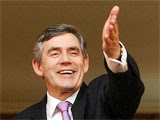
Prime Minister Gordon Brown will push for progress on world trade talks and an end to the conflict in the Darfur region of Sudan when he travels to the U.S. to meet President George W. Bush today.
Brown, who took over from Tony Blair on June 27, will visit Bush in Camp David, Maryland today and tomorrow and address the United Nations in New York on July 31. His spokesman Michael Ellam said trade and Darfur are the ``main issues'' the British government wants to talk about. U.K. involvement in Iraq will also be discussed, he said.
The meetings mark Brown's opportunity to shape U.K. policy toward the U.S. after he sent conflicting signals about his intentions. While Brown has stressed the importance of maintaining the trans-Atlantic relationship, he has appointed officials critical of Bush to his government.
``It is firmly in the British national interest that we have a strong relationship with the United States,'' Brown said en route to his meeting with Bush. ``We should acknowledge the debt the world owes to the United States for its leadership in the fight against international terrorism.''
Policy toward Iran, Iraq, Afghanistan, global warming and the humanitarian situation in Sudan top the agenda for the talks, according to officials at the White House and Downing Street. Brown already has visited French President Nicolas Sarkozy in Paris and German Chancellor Angela Merkel in Berlin.
World Trade Organization governments must be prepared to engage in ``intensive negotiations'' in September to rescue global trade talks that will otherwise collapse this year, WTO Director General Pascal Lamy said on July 26.
Draft Accord
Earlier this month, WTO mediators published proposals for a draft accord in a bid to breathe life into discussions that have languished for almost six years. The proposals, which the WTO's 150 members have accepted as a basis for compromise, would lower customs duties on products ranging from beef to car parts, cut U.S. subsidies to farmers and force rich economies including the European Union to slash tariffs and abolish subsidized exports.
Peter Allgeier, the U.S. ambassador to the WTO, said the Bush administration's ``fundamental concern'' with the text on farm trade remains the ``uneven treatment'' in steps some countries are being asked to take to cut tariffs and subsidies.
``Trade should be the top priority in the coming months if we are to get a deal,'' Ellam told reporters traveling with Brown today.
Ellam today said bringing peace to Darfur will also top talks with Bush, following agreement between Britain and France to push the United Nations to introduce sanctions against Sudan unless the country takes steps to end the four-year conflict.
Lives Claimed
The conflict already has claimed at least 200,000 lives and driven 2 million people from their homes. The fighting began in 2003 when rebels seeking a larger share of Sudan's political power and oil wealth attacked the government. Sudan's government in turn organized a force to assault rebel villages.
Neither Brown nor Ellam brought up Britain's policy toward Iraq after the Sunday Times newspaper reported that Simon McDonald, Brown's chief foreign policy aide, had been ``doing the groundwork'' with foreign policy representatives in Washington for a possible withdrawal of U.K. troops from Iraq.
Ellam today said the U.K.'s policy toward Iraq remains unchanged and that there is ``no significance'' in Brown not putting Iraq at the top of his agenda.
``I have always been an Atlanticist and a great admirer of the American spirit of enterprise and national purpose, and to the commitment to opportunity for all,'' Brown said in a statement. ``It is our shared ideals that for two centuries have linked the destinies of our two countries,'' he said.
Predecessor Blair
While Brown's words toward the U.S. have barely departed from the tone set out under his predecessor Blair, some of his actions have been less accommodating of the U.S.
Brown tapped to serve as a junior minister at the Foreign Office Mark Malloch Brown, who told the Daily Telegraph on July 14 that Brown would not be ``joined at the hip'' with Bush. Malloch Brown in 2006 criticized U.S. policy at the United Nations, earning a rebuke from U.S. ambassador John Bolton.
More recently, International Development Secretary Douglas Alexander said the U.S. and Britain should adopt a more multilateral approach to foreign policy.
``The U.S.-U.K. relationship will not be what it has been,'' said Charles Kupchan, senior fellow at the Council on Foreign Relations, who served under President Bill Clinton as director of the National Security Council. ``It will be more distant, more conditional. We can expect more tough talk across the Atlantic.''
`War on Terrorism'
Brown also has avoided joining Bush and Blair in speaking about a ``war on terrorism,'' focusing instead on the need to win over ``hearts and minds'' of potential foes in the Middle East. In January, Brown said he would ``be very frank'' with Bush on subjects of disagreement. More recently, he talked about the importance of preserving the alliance.
``I believe relationships between a British prime minister and an American president will be strong, should be strong and I believe will be strengthened in the months and years to come,'' Brown told reporters in London on July 23.
In Britain, Blair's relationship with Bush cost him popularity with voters and won him ridicule from newspaper cartoonists, who portrayed him as Bush's loyal poodle.
Sixty-nine percent of U.K. voters believe Blair as prime minister was too close to Bush, and 58 percent said the war in Iraq was the biggest mistake of the Labour government, according to a BPIX Ltd. survey on April 8.
Popularity Risen
Labour's popularity has risen above that of the opposition Conservative Party for the first time in more than a year following Blair's decision to step down.
Brown's party had the support of 41 percent of voters compared with 32 percent for the Conservatives and 20 percent for the Liberal Democrats, according to a YouGov Plc. poll of 1,877 adults finished on July 27. No margin of error was provided.
U.K. lawmakers have criticized the way the U.S. handled shared intelligence data in the case of Jamil el-Banna and Bisher al-Rawi, two British residents who were held by the Central Intelligence Agency and shipped to the prison in Guantanamo Bay, Cuba.
The episode has ``serious implications for the relationship'' between both countries, said Paul Murphy, a Labour member of Parliament who compiled a 75-page study on the matter released on July 25.
During his visit to Washington, Brown will also meet with Congressional leaders.


